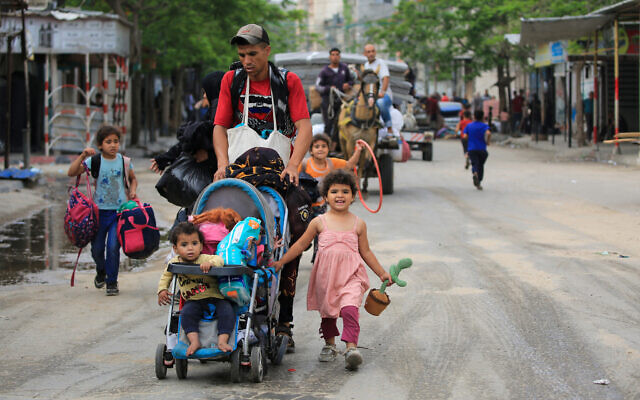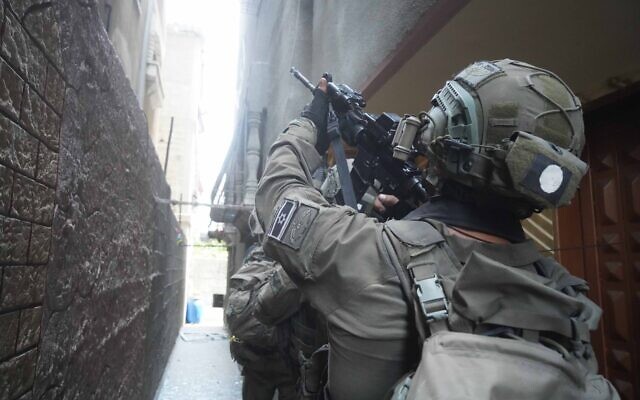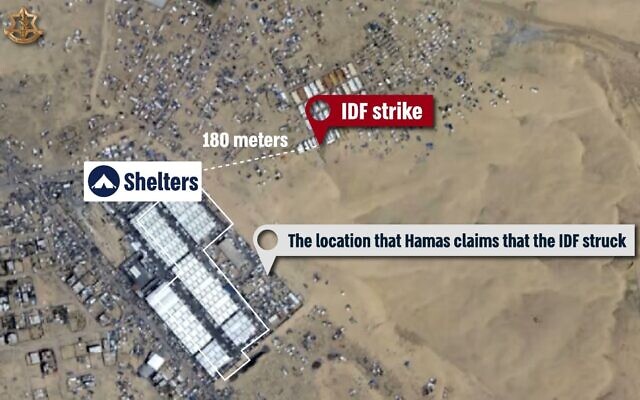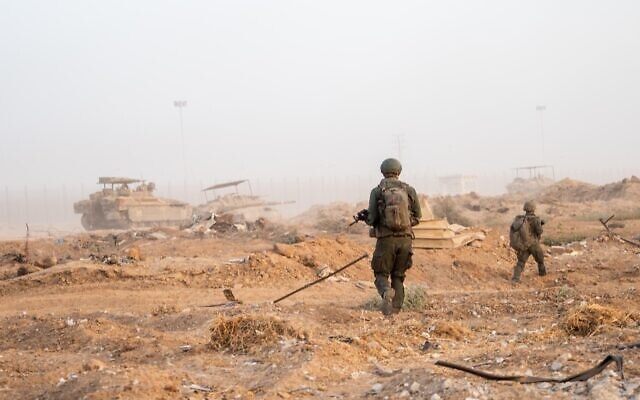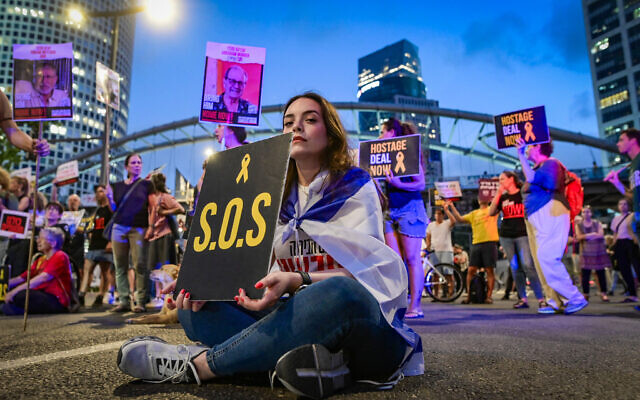Amos Oz’s daughter pushes back against sister’s claim of father’s ‘serial abuse’
Fania Oz-Salzberger rejects allegations made in autobiography, notes that Galia Oz often left her own children in the care of her parents

Fania Oz-Salzberger, the elder daughter of Israeli author Amos Oz, on Wednesday refuted allegations made by her sister Galia Oz that she was beaten by their father, calling them a “series of untruths.”
Oz-Salzberger’s response came after she, her mother, and two of her siblings last month disputed the claims made by her younger sister in a new autobiography titled “Something Disguised as Love,” which has shaken Israel’s image of the novelist, considered among the country’s greatest writers and a perennial Nobel prize favorite. Oz died of cancer in 2018.
In a lengthy post to her Facebook page, under the title “Something disguised as truth,” Oz-Salzberger wrote that the book’s allegations are “a simple and horrible grammatical ploy.”
“Turning a one-time past into a continuous past. Past perfect to past continuous. From ‘he hit me once’ to ‘he used to hit me,’ to ‘he always hit me,'” she wrote.
As proof that her sister had no fear of abuse from Oz, she noted that Galia and her husband would leave her own children in the care of their grandparents, “as babies, toddlers, and children.”
“Countless days and nights in the home of a psychopath and his collaborator,” Oz-Salzberger wrote sarcastically.

Oz-Salzberger, a professor of history at the University of Haifa, went on to say that she doesn’t deny two of the three claims made in the book — that her father had dragged Galia down the front steps of their home on Kibbutz Hulda and that he poured cold coffee on her. But she rejected the third allegation that he would beat their mother.
Their father had dragged Galia, then eight, onto the stoop and called her “garbage,” she said. But Oz-Salzberger, who was 11 at the time, added that she remembered it so well because it was “a one-of-a-kind” incident.
Regarding the cold cup of coffee, Oz-Salzberger said she was not present but believes the account of her sister and a mutual acquaintance.
But, she wrote. “there is just one problem. These are the only two incidents in which Abba [Dad] acted violently against Galia. So it is according to Galia’s book and according to my memory.”
There was no “routine of sadistic abuse” including emotional abuse, Oz-Salzberger wrote.
As for the third point, that Oz had beaten their mother, she wrote, “that needs to be deleted.”
“Abba [Dad] did not beat Imma [Mom],” she wrote.
“There were quarrels here and there, some severe, and high above them stretched a peaceful arbor of deep and spectacular love for life,” Oz-Salzberger said. “Until he took his last breath as Mom and I held both his hands.”
Oz, she recalled, slapped her own face just twice during her childhood. Once, when aged four, she led a group of her friends on a tricycle ride that took them out of the kibbutz and down the road until a passing pickup truck bought them all home. Some of the frantic parents, waiting back at the kibbutz, slapped their children when they arrived, including Oz.
As he delivered the blow, Oz told her “I want this slap to remind you all the days of your life how important it is to be very careful with your life.” She wrote, “And I forgave him on the spot.”
The second, she wrote, was when on October 6, 1973, at the outbreak of the Yom Kippur War, she eavesdropped on an urgent conversation her father was having with another kibbutz member. Aged 13, she demanded to know what they were talking about and Oz responded with a slap “that he certainly wanted to give to the Arab countries, to [Prime Minister] Golda Meir and [Defense Minister] Moshe Dayan.”
“I was furious,” Oz-Salzberger wrote. “For a moment I decided that I was now in favor of the Syrians.”
Oz served as a tank reservist fighting against the Syrians in the north of the country during the three-week conflict that took a heavy toll on Israeli forces.
“When he [Oz] returned home at the end of October and sat on the floor in a dirty uniform for long hours and was silent – then I completely forgave him,” Oz-Salzberger wrote.

In her autobiography, Galia Oz details alleged abuses, writing, “During my childhood, my father beat, cursed and humiliated me.”
“The abuse was creative: He would drag me around the house and throw me onto the stoop outside. He would call me garbage. He didn’t lose his cool and this wasn’t an occasional slap on the face but a routine of serial abuse,” she said.
Oz’s widow and two other children have pushed back against the portrayal of the novelist as an abusive father.
“We knew a different father. A warm, loving, attentive dad who loved his family,” widow Nili Oz wrote in a statement last month that was also signed by Oz-Salzberger and Daniel Oz.
Daniel Oz wrote in a February Facebook post, “My father was not an angel, only a human being, but he was the best human being that I know.”
“Galia remembers that she experienced severe and abusive parenting at our father’s hands. I’m sure — I know — that there is a kernel of truth to her words. Do not erase her. But do not erase us either.”
Oz was Israel’s most widely read and best-known author, and was hailed by President Reuven Rivlin after his 2018 death as the country’s “greatest writer.”
Prime Minister Benjamin Netanyahu called Oz “one of the greatest authors” in Israeli history.
He won dozens of awards, including the Israel Prize and Germany’s Goethe Award, and his books have been translated into 45 languages. He had repeatedly been mentioned as a leading candidate for the Nobel Prize for Literature, but it eluded him.
Born Amos Klausner in Jerusalem in Mandatory Palestine in 1939, he used the city as a canvas for many of his works, including “Black Box” (1987) and “In the Land of Israel.”
Oz was also among the country’s most vocal left-wing activists and supporters of a two-state solution.
In a career spanning half a century, Oz published over 35 books, including 13 novels as well as children’s books and collections of short stories, and hundreds of articles on literary and political topics.



